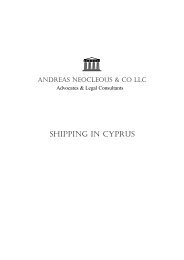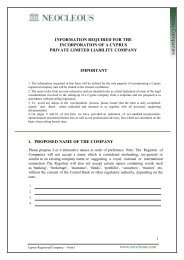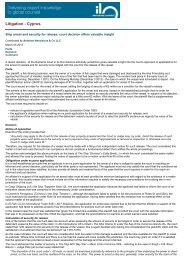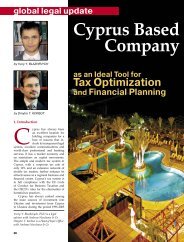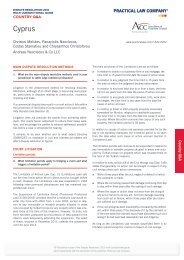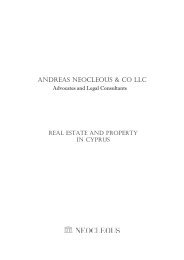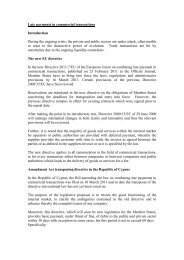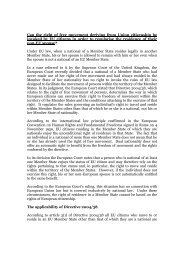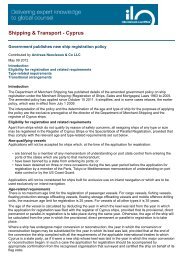Cyprus - Andreas Neocleous & Co
Cyprus - Andreas Neocleous & Co
Cyprus - Andreas Neocleous & Co
Create successful ePaper yourself
Turn your PDF publications into a flip-book with our unique Google optimized e-Paper software.
CYPRUS<br />
CYP/11<br />
Mandatory, Prohibited or Reserved Activities or Purposes<br />
Section 156 of the <strong>Co</strong>ntract Law provides that where one person acts on behalf<br />
of another without that person's knowledge or authority, the latter may elect to<br />
ratify or to disown such acts. If he ratifies them, the same effects will follow as<br />
if they had been performed with his authority.<br />
Ratification may be express or may be implied by the conduct of the person on<br />
whose behalf the acts are done, but there can be no valid ratification by a person<br />
whose knowledge of the facts of the case is materially defective. 11<br />
An authorized act done by one person on behalf of another which, if done with<br />
authority, would have the effect of subjecting a third person to damage, or of<br />
terminating any right or interest of a third person, cannot by ratification be made<br />
to have such an effect.<br />
Operational Aspects<br />
Actual (Express) or Implied Authority<br />
An agent who is appointed by a contract must act in accordance with the terms<br />
of that contract and may not exceed his authority. The authority of an agent may<br />
be actual (express or implied) or apparent. Actual authority is the authority<br />
which the principal has given the agent wholly or in part by means of words or<br />
writing (express), or is regarded by the law as having been given to him because<br />
of legal interpretation or the relationship and dealings of the two parties<br />
(implied).<br />
An actual authority is a legal relationship between principal and agent created by<br />
a consensual agreement to which they alone are parties. Its scope is to be<br />
ascertained by applying ordinary principles of construction of contracts,<br />
including any proper implications from the express words used, the usage of the<br />
trade, or the course of the business and the parties. Where the express authority<br />
is not clear the court will interpret it.<br />
Apparent authority involves the assumption that there is no authority at all.<br />
Under this doctrine, where a principal represents that another person has<br />
authority, he may be bound as against a third party by the acts of that person<br />
within the authority which that person appears to have; in such a case the<br />
principal may be bound although he had not given that person such authority or<br />
had limited that authority by instructions not made known to the third party. The<br />
authority, express or implied, of every agent is confined within the limits of the<br />
powers of his principals.<br />
If an agent deals on his own account in the business of the agency without first<br />
obtaining the consent of his principal and acquainting him with all material<br />
circumstances which have come to his own knowledge on the subject, the<br />
11 <strong>Co</strong>ntract Law, Cap 149, ss 157–158.<br />
(Release 2 – 2013)




